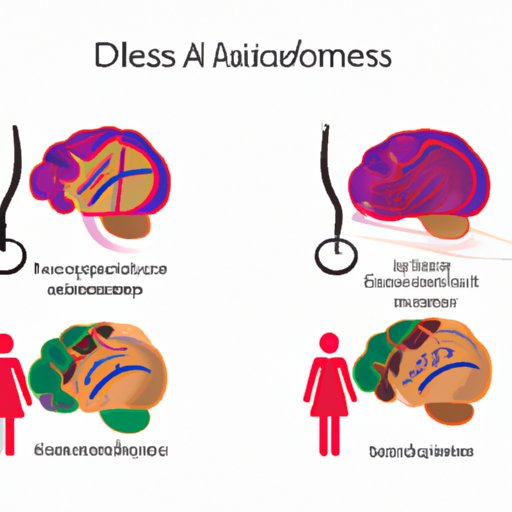
Introduction
Neurodegenerative diseases are a group of conditions that affect the neurons in the brain. These diseases get worse over time and can lead to cognitive and functional decline. It is crucial to understand these diseases to provide better care to individuals affected by them. This article aims to provide a comprehensive guide to neurodegenerative diseases.
Understanding Neurodegenerative Diseases: A Comprehensive Guide
Neurodegenerative diseases are a group of conditions that affect the nervous system. These diseases progressively damage or kill nerve cells, leading to a decline in cognitive and functional abilities. The severity and symptoms of neurodegenerative diseases vary depending on the type of disease, the progression of the disease, and the individual.
Types of Neurodegenerative Diseases
There are many different types of neurodegenerative diseases. Some of the most common neurodegenerative diseases include:
- Alzheimer’s disease
- Parkinson’s disease
- Huntington’s disease
- Amyotrophic lateral sclerosis (ALS)
- Frontotemporal dementia
- Multiple sclerosis
Prevalence and Incidence of Neurodegenerative Diseases
According to the World Health Organization (WHO), neurodegenerative diseases affect millions of people globally. Alzheimer’s disease affects 50 million people worldwide, while Parkinson’s disease affects nearly 10 million individuals worldwide. The prevalence of neurodegenerative diseases is expected to increase with the aging population characteristic of most developed countries.
What Happens to the Brain in Neurodegenerative Disease: Explained
The brain consists of different regions that perform different tasks. In neurodegenerative diseases, specific regions of the brain are affected, leading to changes in cognitive and functional abilities. Each type of neurodegenerative disease affects different regions of the brain.
How Normal Brain Function is Affected by Neurodegenerative Diseases
Normal brain function involves the coordination of different regions of the brain. These regions communicate with each other using neurotransmitters, which are chemical messengers in the brain. Neurodegenerative diseases disrupt this communication, leading to cognitive and functional decline.
Description of How Different Types of Neurodegenerative Diseases Affect Brain Structure and Function
Each neurodegenerative disease affects different regions of the brain, leading to specific symptoms. Alzheimer’s disease, for instance, affects the hippocampus, a region involved in memory. Parkinson’s disease, on the other hand, affects the substantia nigra, leading to motor symptoms such as tremors and rigidity. Huntington’s disease affects the striatum, leading to motor symptoms and cognitive decline.
Exploring the Causes and Symptoms of Neurodegenerative Diseases
Causes of Neurodegenerative Diseases
There is no single cause of neurodegenerative diseases. Age is a significant risk factor for many neurodegenerative diseases. Genetics also plays a role in some neurodegenerative diseases. Other risk factors for neurodegenerative diseases include inflammation, environmental toxins, and traumatic brain injury.
Symptoms of Neurodegenerative Diseases
The symptoms of neurodegenerative diseases vary depending on the type of disease and the individual. Some common symptoms include:
- Memory loss and confusion
- Mood changes and depression
- Motor symptoms like tremors, stiffness, and difficulty with movement
- Difficulty with speech and language
- Cognitive decline, including problems with reasoning and decision-making
Living with Neurodegenerative Disease: How to Cope and Seek Help
Coping Mechanisms for Individuals with Neurodegenerative Diseases
A diagnosis of a neurodegenerative disease can be difficult to accept, and it is essential to have effective coping mechanisms. Some coping mechanisms for individuals with neurodegenerative diseases include seeking support from family and friends, staying active, engaging in hobbies, and accessing support groups specifically for individuals with neurodegenerative diseases.
Available Resources and Support Groups for Individuals with Neurodegenerative Diseases
There are many resources and support groups available for individuals with neurodegenerative diseases and their families. Many organizations provide support through education, advocacy, and fundraising. Examples include the Alzheimer’s Association, the Michael J. Fox Foundation, and the ALS Association.
New Developments in the Treatment of Neurodegenerative Diseases: Hope on the Horizon
Current Approaches to Managing Neurodegenerative Diseases
Currently, there is no cure for neurodegenerative diseases, and treatment options aim to manage symptoms. Medications such as cholinesterase inhibitors and memantine are used to treat Alzheimer’s disease. Levodopa is the main medication used to treat Parkinson’s disease. Physical and occupational therapy can also be beneficial in managing symptoms.
Promising Therapies or Treatment Options
There is ongoing research into potential therapies for neurodegenerative diseases. Stem cell therapy, gene therapy, and immunotherapy are some of the future potential options. While these therapies are still experimental, they provide hope for future treatments.
Conclusion
Neurodegenerative diseases affect millions of people worldwide and can lead to cognitive and functional decline. It is essential to understand these diseases to provide better care for those affected. While there is no cure for neurodegenerative diseases, managing symptoms with medication, therapy, and support is crucial in improving the quality of life for individuals living with these diseases.
Remember, resources and support groups are available for individuals with neurodegenerative diseases. It is important to seek help from doctors, support organizations, and support groups if affected by these diseases.




